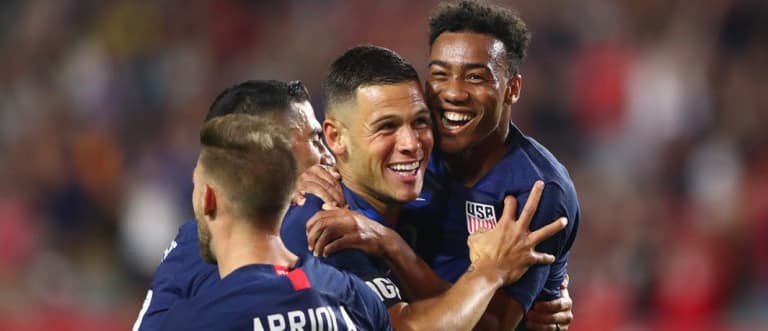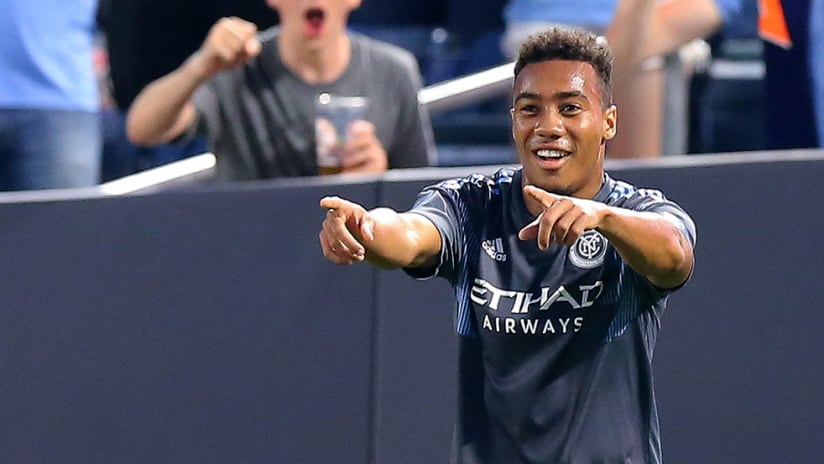Do you take the good that you have, or do you assume the risk of pushing for great?
In the 89th minute of the US men's national team’s game against Panama last month, Jonathan Lewis picked up the ball 30 yards from goal, drove forward, set the ball on his right foot, then dragged it across his body and accelerated left.
He separated from his defender by more than a yard and played a pass across the face of goal that Christian Ramirez tapped home to put the US up 3-0.
Lewis showed a burst and grace that made USMNT fans’ eyes light up.
The 21-year-old was at it again on Saturday against Costa Rica, coming off the bench to set up Sebastian Lletget's game-winning goal:
Lewis now has three goals and six assists in 599 minutes – that’s an average of one or the other every 66 minutes – between New York City FC and the USMNT. Yet he’s generally struggled to get off the bench for NYCFC.
Head coach Dome Torrent has remained consistent in his answers about Lewis, telling reporters last summer, "I prefer [taking it] step-by-step because he’s a young player, and I am here, my staff is here, to improve the young players."
NYCFC fans – and now some USMNT fans – have been clamoring for Lewis to get onto the field more. Generally, when players put up that type of production it suggests they should move into the starting lineup. You prove you’re ready in one role, so you get promoted to the next.
I agree Lewis should be given a greater role in the team – he was even loaned out to Louisville City FC for a month towards the end of last season – and it would shocking if more playing time doesn’t come this year, whether at NYCFC or somewhere else.
But I’m less sure what the role should be. Starter? Or supersub?
We’ve always considered getting into the starting lineup as a promotion, a required step on a player’s career path. But what if that’s the wrong mindset? Maybe becoming a starter shouldn’t always be the final goal. Perhaps the best way for Lewis to maximize his contribution, and thus his career trajectory and earning potential, is coming off the bench.
Lewis as a supersub
The skill set tells a clear story. He is very good at:
- Attacking defenders 1v1 in space
- Running behind the opposition’s defense
- Closing down and winning loose balls
And he isn’t as good at:
- Controlling or connecting passes in tight spaces
- Positional awareness on defense
His attributes fit a certain type of game – open, stretched, frenetic – the type of scenario that generally comes after the 60th minute. We’ve all witnessed what he can do at that point in a match. It’s special. Why wedge a golden peg into a square?
There’s a counterpoint to be made against the supersub approach: Wouldn’t he be even better if he rounded out his game? To use Torrent’s words, how do you “improve the young players” unless you give him or her more responsibility?
Does he need to start?
It’s true, he might not be able to reach his maximum ability if he doesn’t become a starter. But one of the basic truths of life is that if you try to push through a wall, you might end up on your butt. And the posters from elementary school aren’t always true – you don’t always succeed if you try again. Sometimes players end up worse if they try to push through their comfort zone.
Then there’s a second counter-argument that arrives. He doesn’t need to fix his weaknesses, but just get more minutes to play to his strengths. Ethan Finlay’s rise in 2015 provides a nice example of this; Finlay is a similar player to Lewis and he didn’t fix all of his flaws, but he figured out how to mold his style into Columbus Crew SC’s system en route to an MLS Cup appearance and a Best XI selection.
It’s a fair point, but we need to remember the role and fragile state of confidence and naivety in an attacking player. Lewis steps on the field with swagger right now. But what happens if he struggles through the first 15 minutes of a game? Or he fails to score in three straight starts?
Again, Lewis has something special. He adds a vital component to a team. What’s it worth to risk that? If you give him a run of starts, maybe he takes his game to the next level, but maybe he loses the spark that he originally offered.

Jonathan Lewis (at right) celebrates with Christian Ramirez and their USMNT teammates | USA Today Sports Images
This all speaks to way soccer views substitutes and substitutes, as well. Here’s a basic question to ponder: Why is it that teams start their best and most in-form players, when the point of the game is to win at the end? It’s more important to be winning after 90 minutes than 30 minutes, yet teams bring on inferior players to play in the 90th minute.
Being a substitute does not, or at least should not, typecast a player as inferior. Value him like a starter, pay him like a starter, but use him in the way that maximizes his ability and his contribution to the team. Ole Gunnar Solskjaer’s playing career at Manchester United would be the best example. Don’t let the questions of what he can’t do or could become detract from what he offers now.
I won’t argue if Lewis breaks into the starting lineup. I’ll be excited to see what he can do. But I’ll have reservations.
Not because he doesn’t the ability to become a star, but rather precisely because he does have the ability to become a star, if used properly.













